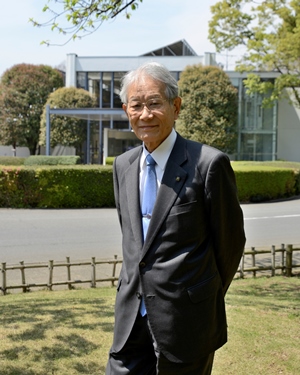Jun. 30, 2015 Special Feature Other
Visionary science
Interview with President Hiroshi Matsumoto
You were appointed president of RIKEN in April 2015. Do you have plans to change the way research is conducted at RIKEN and in Japan as a whole?
 © 2015 RIKEN
© 2015 RIKEN
Over the years, I have come to believe that researchers should not simply publish journal articles based on their investigations. Rather, they should achieve results based on a vision of the world that societies want to create.
I find it strange that scientists often only consider applications of their work as an afterthought, once their research is complete—it should be the other way around. As has been said: “Necessity is the mother of invention.” Japan offers many examples of this approach, and the problem seems to stem from the nature of Japanese academia. Most researchers spend their entire careers in a single laboratory, joining a university as a graduate student or postgraduate researcher, and rising up the ranks from assistant professor to full professor. They work with the simple goal of becoming the top researcher in their particular field, reading every paper published in their specific branch of science, but no papers published in other branches. As a result, although they gain a deep knowledge of a very narrow subject area, they sacrifice a broader understanding—especially of things outside of the natural or physical sciences.
My view is that while scientists should carry out science, they should first and foremost be members of their communities, contributing to the more universal goals of society. This is a conviction that I have maintained throughout my tenure as president of Kyoto University and will continue to uphold as president of RIKEN, where I hope to introduce changes that bring science closer to achieving our societal vision.
Why is it important for scientists to work based on a vision?
It is amazing to think that more than seven billion people live on this small planet of ours. Eventually, our civilization will colonize the solar system, taking advantage of the resources available in this immense Universe around us. As scientists, our primary duty is to ensure that the human race can survive until that time comes.
The irony is that science and technology underpin the affluence of modern society, but could also lead to its demise. As we advance, we are fooled by our affluence into consuming more and more of our limited resources. Eventually, we will run out of resources and will have to rely even more on science to make up for the deficit.
This is a vicious circle that we can only break through personal and cultural philosophy. Every individual must understand that science alone is not the solution. We need philosophy working hand-in-hand with science to ensure that we do not wipe ourselves out. This is partly why one of the recently appointed executive directors at RIKEN is a philosopher rather than a natural scientist. I believe that the two fields must never be separated.
How do you plan to encourage RIKEN to pioneer new fields of research under your presidency?
RIKEN today has many research centers, where outstanding scientists are engaged in research of the highest standard in their fields. While there are an infinite number of things that researchers at RIKEN can study, we need to be selective and concentrate on the most powerful subjects to retain our leading position.
RIKEN should model how science can be done. Under our new status as a national research and development institute, it is particularly vital that we maintain an environment that allows scientists to conduct their research freely and autonomously, even while remembering that their work must serve society in some way.
It is also crucial to keep in mind that interdisciplinary exchange is essential for pioneering new fields. Opportunities for exchange at RIKEN have been established through forums such as the RIKEN Science Council, the RIKEN Scientists’ Assembly and the RIKEN Interdisciplinary Exchange Evenings, but I would like to encourage more exchange on a day-to-day basis. New ideas tend to emerge when people converse through informal avenues.
These exchanges must go beyond the boundaries of RIKEN as well. I plan to take a fresh look at how we recruit researchers. Typically, laboratory heads look for good researchers within their area of speciality. While these new hires can flourish and produce outstanding results, the field as a whole stagnates. As president, I will encourage our laboratory heads to recruit talented researchers from outside their own disciplines—even extending to people who work in the humanities and social sciences. Essentially, all science springs from a single tree trunk. By encouraging crosstalk between the many branches of science, we will contribute
